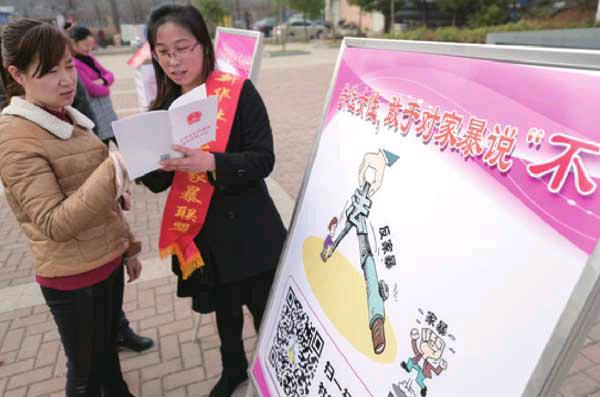A Long Way to Go
2016-12-28ByYinPumin
By+Yin+Pumin
From being a smiling 25-year-old who was expecting to become a mother, Li Hongxia, a resident in Beijing, became part of a grim statistic in February when her husband strangled her while she was hospitalized. It was the culmination of a period of documented battery.
What heightened the tragedy was that it occurred on the eve of Chinas first AntiDomestic Violence Law coming into effect. While the law was drafted and submitted to the public for review nearly two years ago, it came into force on March 1.
On November 24, a day ahead of the International Day for the Elimination of Violence Against Women, the All-China Womens Federation hosted a roundtable in Beijing to look at the progress made so far and the issues that still need to be addressed.
Song Xiuyan, Vice President of the federation, said local governments are taking“creative measures” for the effective implementation of the law. So far, 17 provinces, municipalities and autonomous regions have issued 110 supporting policies. These policies provide practical measures like building a mechanism to report incidents of domestic abuse, providing a shelter for victims, issuing protection orders and police warnings.
Jiang Xin, chief of the womens federation of central Chinas Hunan Province, said the provincial government has established a warning mechanism, cautioning aggressors of punitive action against continued domestic violence. The system started functioning from March and till date has helped restrain more than 30 offenders from launching further attacks.
Indeed, Hunan preempted the law. In January, a local court issued a restraining order to an abusive husband, warning him of the consequences of causing harm to his wife in the future.
Nanjing in east Chinas Jiangsu Province has been another forerunner. Jiang Ping, Deputy Director of the Nanjing Municipal Bureau of Public Security, said the city has implemented a warning system since 2014.
“In the past two years, more than 900 restraining orders were issued and most of the offenders have stopped,” Jiang said.
Since the law came into effect, other provinces too have been implementing the mechanism and according to official statistics, 347 restraining orders have been issued countrywide since then.
Issuing personal protection orders is another creative idea proposed by local governments.
According to Jiang Xin, Hunan has seen 70 protection orders since the enactment of the Anti-Domestic Violence Law.
Gradually becoming aware of how the law can help them, battered wives are now turning to courts for protection. Liu Shuangyu, Vice President of the No.3 Intermediate Peoples Court in Beijing, gave an example of a singer who had sought protection from the court. “Our judges investigated the case, and helped her collect evidence and file a lawsuit,” Liu said. “Intimidated by the potential consequences, the husband admitted his fault and stopped abusing her.”
The Beijing court has issued nine protection orders since March. In Nanjing, the Intermediate Peoples Court has received 55 applications for personal protection orders. Zhou Kan, a judge with the court, said 31 of the applications have resulted in protection orders.
Overcoming mental trauma
However, as Liu pointed out, there are difficulties when the abuse is psychological and not physical. Such abuse is difficult to prove, though it can still cause the victim to suffer.
“Although the law includes psychological abuse into the category of domestic violence, in practice, it is not easy to get evidence,” Liu said. She also talked about how difficult it is to provide mental care and protection to traumatized victims when they go through court procedures.
“We should do further research and devise practical ways to protect victims of psychological abuse,” she said.
“Although some behaviors, such as ‘cold war, are not included as domestic violence in the law, they still cause mental suffering in the long run,” said Zhu Meihua, a professor at Shanghai-based East China University of Science and Technology.
Concerns to speak out
In China, domestic violence was long thought of as a private matter and victims seldom sought help, regarding it as shameful to disclose domestic problems to outsiders.
According to a report released by the All-China Womens Federation in 2014, 39 percent of women aged between 18-49 who had had partners claimed they had experienced physical violence from their partners, though few lodged official complaints.
“Domestic violence is not a family issue, and to prevent it requires the involvement of the government and society as it is a big matter related with the interests of women,” said Xu Li, an associate professor at East China University of Political Science and Law, in an article on the Anti-Domestic Violence Law on Shanghai-based Jiefang Daily in 2015.
Chen Tingting, the Asia Foundations program officer for womens empowerment, was quoted by a non-profit organization as saying that the new laws immediate effect has been “a wave of media coverage spotlighting domestic violence cases, including the deaths of two women around the time it came into force.”
“A consistent thread in these womens stories was an inability to leave the abusive relationships or to disclose their suffering,”she said.
“The new law allows close relatives to file a complaint on behalf of victims who may not be able to do so on their own. This would then allow police or womens federations to request restraining orders from the courts,”she said.
Although the vast majority of domestic violence sufferers are women worldwide, there are also some male victims. In 2015, southwest Chinas Sichuan Province handled 1,845 cases of domestic violence; 2 percent involved adult male victims.
In May, a man called Huang Xiaochun applied to the Shunyi District Peoples Court in Beijing for divorce, claiming to be a victim of domestic violence. Huang said he was continuously humiliated by his wife because of his low salary. He also said he had been chronically depressed for two years and had begun to take it out on his parents and daughter. “Today, my daughter is afraid of me,” he said.
Wu Ning, a psychologist with the No.187 Hospital of the Peoples Liberation Army in Haikou, south Chinas Hainan Province, said in psychological abuse, male victims often struggle with anger, fear, anxiety and depression. “If not dealt with, such emotions could deteriorate...and most commonly, be unleashed on the children at home,” Wu said.
